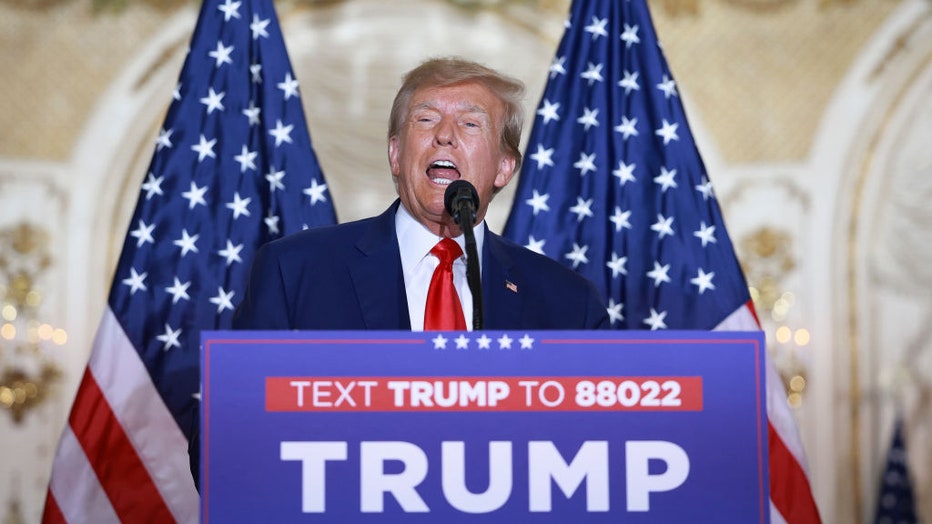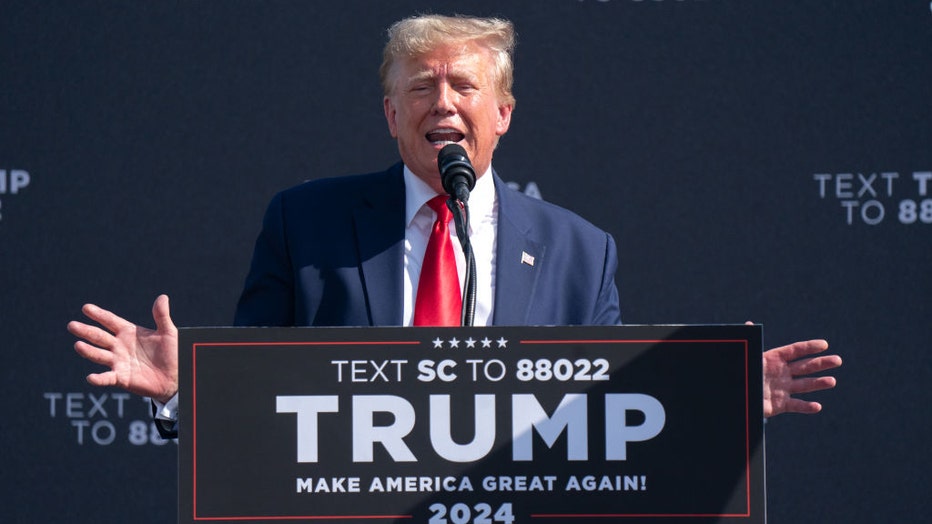Where former President Donald Trump stands on key issues
Two weeks out from Election Day Trump, Harris make appeals to undecided voters
We’re officially two weeks out from Election Day and both former President Donald Trump and Vice President Kamala Harris are making their last efforts to win over undecided voters in key swing states.
Election Day 2024 is soon approaching, with voters already heading to the polls as former president Donald Trump and Vice President Kamala Harris battle on the campaign trail.
JUMP TO: ECONOMY l IMMIGRATION l ABORTION l HOUSING
But where does each candidate stand on several important issues, including the economy, immigration, abortion and housing?
Featured
Where to vote in DC, Maryland and Virginia
With Election Day fast approaching, here is where you can cast your ballot in D.C., Maryland and Virginia.
Here's where the former president stands on the key topics:
Check here for real-time race results on Election Day!
Where Trump stands on the economy
The former president wants a dramatic expansion of tariffs on nearly all imported foreign goods. Trump suggested tariffs as high as 100% on Chinese goods. He treats these taxes as a way to fund other tax cuts, lower the deficit and possibly fund child care — though the tariffs could raise prices for consumers without generating the revenues, the AP noted.
To address the nation’s housing issue, Trump has shared ideas for lowering housing costs — including his suggestion in a June speech in Wisconsin that stopping illegal immigration would reduce demand for housing and bring down prices.
Donald Trump holds rally on Long Island
Former President Donald Trump held a rally on Long Island Wednesday night. This was his first rally since a second apparent assassination attempt against him. FOX 5 NY's Morgan McKay has the details.
During his first presidential term, Trump passed the Tax Cut and Jobs Act in 2017, but it expires in 2025. The law slashed corporate tax rates and changed how the nation taxes businesses in the U.S. while temporarily cutting personal income and estate taxes, changes that benefited wealthy people and businesses.
Inflation
Trump has called for cutting taxes and regulations in hopes of lowering inflation and has encouraged increasing oil production in order to lower energy prices, Forbes noted. He has also called for ending taxes on Social Security benefits and touted cutting energy and electricity costs in the U.S. by increasing fossil fuel production.
Wages
Trump wants to make tips tax-free under a new proposal, although specifics of how the plan will work are unknown. Trump also promised to eliminate taxes on tipped income, but this would require approval by Congress.
Trump announced his plan during a June 9 rally in Nevada.
He has not explained whether he wants to exempt tips from just income taxes or the payroll tax too. The payroll tax funds Medicare and Social Security, the AP noted.
For workers, a general exemption may mean more take-home pay. And for the federal government, it could mean bigger budget deficits.
Taxes
Trump proposed to extend the 2017 tax cuts that he signed into law, when he was president, which will expire at the end of 2025. That package slashed the corporate tax rate from 35% to 21% and doubled the standard deduction and child tax credit, the Associated Press reported.
These parts will remain until a new law is implemented, but other tax cuts in the former president’s package will end without action by Congress. Trump told the AP that he wants to trim the corporate tax rate to 15% and cancel any tax hikes that happened under President Joe Biden.
Trump speaks out over the DOJ suing Virginia
Former President Donald Trump speaks on recent charges against Virginia over purging voter rolls.
Trump has urged Congress to pass legislation giving the president authority to impose a reciprocal tariff on any country that imposes one on the U.S.
Much of the Republican presidential candidate's trade agenda has focused on China. Trump has proposed phasing out Chinese imports of essential goods including electronics, steel and pharmaceuticals and wants to ban Chinese companies from owning U.S. infrastructure in sectors such as energy, technology and farmland.

Former President Donald Trump speaks during an event at the Mar-a-Lago Club April 4, 2023 in West Palm Beach, Florida. (Photo by Joe Raedle/Getty Images)
Social Security
Trump has vowed to protect Social Security benefits and opposes raising the retirement age, according to the platform on his campaign website. He hasn’t laid out a plan to fix the funding gap.
Trump has pointed to increased oil and gas drilling as a means to pay for Social Security, but according to the nonpartisan Committee for a Responsible Federal Budget, "it would be impossible to fix Social Security even if all federal land were opened to drilling operations."

Former President Donald Trump speaks to a crowd during a campaign rally on September 25, 2023 in Summerville, South Carolina. (Photo by Sean Rayford/Getty Images)
He has also proposed eliminating taxes on Social Security benefits, but he hasn’t said how to make up the major loss in revenue. Trump’s proposal would add $1.6 trillion to the deficit and increase Social Security’s 75-year shortfall by 25%, according to the Committee for a Responsible Federal Budget. The think tank said it would also move the insolvency date of the Social Security trust fund – the fund that will trigger an automatic 17% cuts to benefits in 2035 – up by more than a year.
Republicans have generally been opposed to raising taxes to fund Social Security. The official GOP platform approved at the Republican National Convention in July was adamant that Trump will not cut "one penny" from Social Security or Medicare.
"American Citizens work hard their whole lives … These programs are promises to our seniors, ensuring they can live their golden years with dignity," the Republican platform states.
What Trump has said about border security
Trump has worked closely with Stephen Miller, a former top aide who is expected to take a senior role in the White House if Trump wins. Miller describes a Trump administration that will work with "utter determination" to accomplish two goals: "Seal the border. Deport all the illegals."
To accomplish that, Trump would revive travel bans from countries deemed undesirable, such as majority-Muslim countries. He would launch a sweeping operation by deputizing the National Guard to round up immigrants, hold them in massive camps and put them on deportation flights before they could make legal appeals.
He’d also bring back policies he put in place during his first term, like the Remain in Mexico program and Title 42, which placed curbs on migrants on public health grounds. And he’d revive and expand the travel ban that originally targeted citizens from seven Muslim-majority countries.
After the Oct. 7 Hamas attack on Israel, he pledged new "ideological screening" for immigrants to bar "dangerous lunatics, haters, bigots, and maniacs." He’d also try to deport people who are in the U.S. legally but harbor "jihadist sympathies." He’d seek to end birthright citizenship for people born in the U.S. whose parents are both in the country illegally.
How Trump sees the border crisis
Immigration has been at the center of Trump’s political identity since he announced his first campaign in 2015. He paints a picture of a border that is out of control, threatening national security and the economy. If elected to a second term, he’s pledged to deport millions of people living in the country illegally.
Where Trump stands on abortion rights
Trump has wavered on his abortion stances this campaign cycle, but has ultimately leaned on abortion being a state’s right.
Trump’s states-based narrative is among his attempts to appear more moderate on abortion rights, which have emerged as one of the GOP’s greatest vulnerabilities heading into November.
During the presidential debate, Trump falsely claimed that some states permit abortions after birth, a claim he has repeated several times. In reality, infanticide is criminalized in every state, and no state has passed a law allowing such a practice.
He has said he would not sign a national abortion ban into law if one landed on his desk and recently said he would not try to block access to abortion medication. He told Time magazine that it should also be left up to states to determine whether to prosecute women for abortions or to monitor their pregnancies.
But Trump repeatedly declined to say during the presidential debate if he would veto a national abortion ban if he were elected again — and he repeatedly took credit for appointing the three Supreme Court justices who helped overturn the constitutional right to abortion.
He has also said that, if he wins, he wants to make IVF treatment free for women.
Where Trump stands on housing issues
According to LendingTree, Trump has not yet unveiled many of his plans regarding housing. However, here are a few proposals that he or his campaign has mentioned during this election season.
Reduce immigration
A Trump campaign spokesperson was quoted via CNBC as saying that a Trump administration will "stop the unsustainable invasion of illegal aliens, which is driving up housing costs." There is debate on how many immigrants, including those lacking permanent legal status, influence housing costs. Fewer immigrants without legal status could free up some housing supply and may move costs down somewhat. That said, it’s not clear how much additional supply this would create.
Eliminate regulations
The Trump campaign’s national press secretary, Karoline Leavitt, has stated — via The New York Times — that a future Trump administration would "eliminate costly regulations and free up appropriate portions of federal land for housing." According to the former president, the goal of eliminating these regulations and allowing for more development on federal land is to cut the price of a home in half.
Trump and Harris seem to agree on plans to remove certain regulations and open more land for development. However, the specific regulations that the candidates would attempt to remove and the kind of lands they would allow development on are unlikely to align.
Lower mortgage rates
According to Leavitt, reported by the Times, Trump also has a "real plan to defeat inflation, bring down mortgage rates."
Lower mortgage rates would help make homebuying more affordable. Snagging a lower rate can not only reduce mortgage payments, but it can potentially save borrowers tens of thousands of dollars over the lifetime of their loan.
It’s unclear at this point how the Trump administration plans to lower mortgage rates, but these rates have already come down noticeably in recent months. Regardless of who wins the election in November, there’s a strong chance that they’ll continue to decline as inflation subsides and the broader economy softens.
The FOX Digital Team, as well as the Associated Press, helped contribute to this report.


